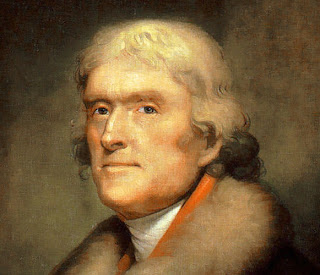President Joseph Biden, 16 January, 2022
It was today, the 16th of January in 1786, that the Virginia General Assembly adopted Thomas Jefferson’s Statute of Religious Freedom.
Jefferson was a brilliant and troubled man. In my circles the troubled is mostly recalled in the moment. As it should be. There were some truly ugly aspects to whom the man was.
And Jefferson gave our nation many gifts. Many of which should not be forgotten, either.
The statute of religious freedom is, no doubt, one of the greatest of these gifts.
Jefferson himself saw this as one of the three items worth noting on his tombstone. And it becomes the template for our ongoing national dialogue on the relationship of church and state.
During these troubled times where a significant segment of the population wants to elevate one sect as the true American religion, that this statute exists at the core of our founding documents is critical to recall. It is worth noting the language guarantees freedom from religion as well as freedom of religion.
Since 1993 this day was marked out for national observance with an annual statement from the sitting president of the United States.
A Statute of Religious Freedom
I. Whereas Almighty God hath created the mind free; that all attempts to influence it by temporal punishments or burthens, or by civil incapacitations, tend only to beget habits of hypocrisy and meanness, and are a departure from the plan of the Holy author of our religion, who being Lord both of body and mind, yet chose not to propagate it by coercions on either, as was in his almighty power to do; that the impious presumption of legislators and rulers, civil as well as ecclesiastical, who being themselves but fallible and uninspired men, have assumed dominion over the faith of others, setting up their own opinions and modes of thinking as the only true and infallible, and as such endeavouring to impose them on others, hath established and maintained false religions over the greatest part of the world, and through all time; that to compel a man to furnish contributions of money for the propagation of opinions which he disbelieves, is sinful and tyrannical; that even the forcing him to support this or that teacher of his own religious persuasion, is depriving him of the comfortable liberty of giving his contributions to the particular pastor, whose morals he would make his pattern, and whose powers he feels most persuasive to righteousness, and is withdrawing from the ministry those temporary rewards, which proceeding from an approbation of their personal conduct, are an additional incitement to earnest and unremitting labours for the instruction of mankind; that our civil rights have no dependence on our religious opinions, any more than our opinions in physics or geometry; that therefore the proscribing any citizen as unworthy the public confidence by laying upon him an incapacity of being called to offices of trust and emolument, unless he profess or renounce this or that religious opinion, is depriving him injuriously of those privileges and advantages to which in common with his fellow-citizens he has a natural right; that it tends only to corrupt the principles of that religion it is meant to encourage, by bribing with a monopoly of worldly honours and emoluments, those who will externally profess and conform to it; that though indeed these are criminal who do not withstand such temptation, yet neither are those innocent who lay the bait in their way; that to suffer the civil magistrate to intrude his powers into the field of opinion, and to restrain the profession or propagation of principles on supposition of their ill tendency, is a dangerous fallacy, which at once destroys all religious liberty, because he being of course judge of the tendency will make his opinions the rule of judgment; and approve or condemn the sentiments of others only as they shall square with or differ from his own; that it is time enough for the rightful purposes of civil government, for its officers to interfere when principles break out into overt acts against peace and good order; and finally, that truth is great and will prevail if left to herself, that she is the proper and sufficient antagonist to error and has nothing to fear from the conflict, unless by human interposition disarmed of her natural weapons, free argument and debate, errors ceasing to be dangerous when it is permitted freely to contradict them.
II. Be it enacted by the General assembly, that no man shall be compelled to frequent or support any religious worship, place, or ministry whatsoever, nor shall be enforced, restrained, molested, or burthened in his body or goods, not shall otherwise suffer on account of his religious opinions or belief; but that all men shall be free to profess, and by argument to maintain, their opinion in matters of religion, that that the same shall in no wise diminish, enlarge, or affect their civil capacities.
III. And though we well know that this assembly elected by the people for the ordinary purposes of legislation only, have no power to restrain the acts of succeeding assemblies, constituted with powers equal to our own, and that therefore to declare this act to be irrevocable would be of no effect in law; yet we are free to declare, and do declare, that the rights hereby asserted are of the natural rights of mankind, and that if any act shall be hereafter passed to repeal the present, or to narrow its operation, such act will be an infringement of natural right.













